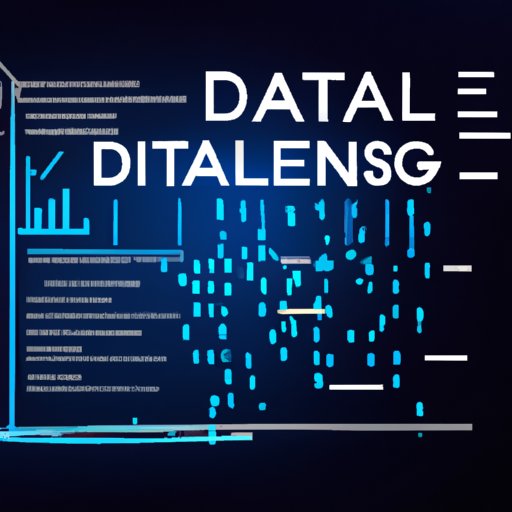Introduction
Data science is a rapidly growing field that combines elements from computer science, mathematics, and statistics to solve complex problems. As the amount of data available continues to grow exponentially, the need for data scientists to interpret and analyze this data has also increased. Data science can be used to uncover insights, develop strategies, and drive business decisions.
The benefits of learning data science are vast. According to a study by McKinsey Global Institute, data science and analytics occupations could generate up to $650 billion in value across the U.S. economy by 2021. Professionals with data science skills will have access to high-paying jobs and the ability to make meaningful contributions to their organization.
Understand the Basics
Before you can get started with data science, it’s important to understand the basics. Data science involves collecting, organizing, analyzing, and interpreting data. To do this effectively, you must have a strong understanding of the fundamentals of data science, such as data structures, algorithms, and databases.
Data scientists use a variety of tools to analyze data, such as analytical software, programming languages, and statistical software. Understanding how to use these tools is essential for success in data science. It’s also important to have a basic understanding of mathematical concepts such as probability, linear algebra, and calculus.
Develop Your Skills
Once you understand the basics of data science, the next step is to develop your skills. One of the most important skills for data scientists is coding. Learning coding languages such as Python, R, and SQL will give you the ability to manipulate data, create visualizations, and develop machine learning models.
It’s also important to gain hands-on experience working with different types of data sets. You can do this by participating in online courses, hackathons, or data science competitions. These activities will provide you with the opportunity to practice your skills and gain valuable experience.
Learn Visualization Techniques
Data visualization is an important aspect of data science. It allows data scientists to visualize large amounts of data in an easy-to-understand format. There are a variety of data visualization techniques, including bar charts, line graphs, scatter plots, and heat maps.
Effective data visualizations can help data scientists uncover insights and communicate them in an engaging way. To become an expert in data visualization, it’s important to understand how to choose the right chart type for the data, as well as how to design the visualization for maximum impact.

Become an Expert in Statistics
Statistics is another important component of data science. Data scientists use descriptive and inferential statistics to draw conclusions from data. Descriptive statistics involves summarizing data, while inferential statistics involves making predictions about future events based on past data.
Understanding statistics is essential for data scientists. They use statistical analysis to identify patterns, trends, and relationships in data. They also use statistical methods to evaluate the accuracy of their predictions and models.
Practice Machine Learning
Machine learning is a type of artificial intelligence that uses algorithms and statistical models to find patterns in data. It enables computers to “learn” from data without being explicitly programmed. Machine learning is one of the most powerful tools available to data scientists, as it can be used to automate processes and make predictions.
To become an expert in machine learning, it’s important to understand the different types of algorithms and techniques used. Examples of machine learning algorithms include decision trees, support vector machines, and neural networks. It’s also important to gain hands-on experience working with different types of data sets.
Network with Other Data Scientists
Networking is an important part of any career, and data science is no exception. Networking with other data scientists can help you stay informed on the latest trends and technologies, as well as build relationships with potential employers, colleagues, and mentors.
Attending conferences and joining online communities are two great ways to network with other data scientists. Additionally, building relationships with other professionals in the field can help you stay motivated and inspired to continue learning.
Conclusion
Data science is a rapidly growing field that offers many opportunities for those with the knowledge and skills to succeed. To get started with data science, it’s important to understand the basics, develop your skills, learn visualization techniques, become an expert in statistics, practice machine learning, and network with other data scientists.
With the right resources and dedication, anyone can become a successful data scientist. There are numerous online courses and tutorials available to help you along your journey. With the right guidance and motivation, you can become an expert in data science in no time.
(Note: Is this article not meeting your expectations? Do you have knowledge or insights to share? Unlock new opportunities and expand your reach by joining our authors team. Click Registration to join us and share your expertise with our readers.)
